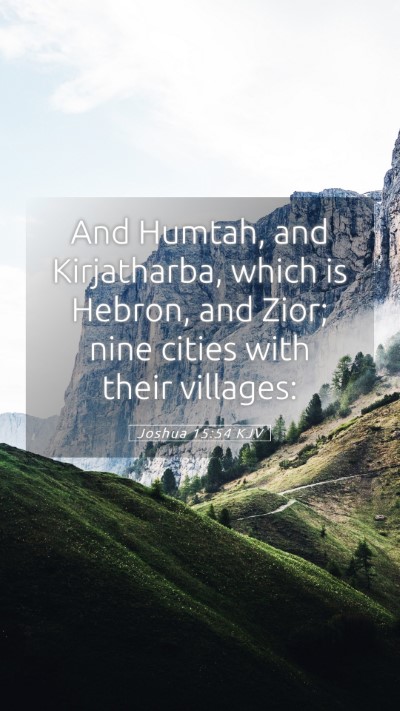Bible Verse Commentary: Joshua 15:54
Joshua 15:54 states: "And En-gedi, and Tappuah, and Hebron; which are the cities of the rest of the tribe of Judah." This verse is part of the broader narrative regarding the allocation of land among the tribes of Israel, specifically the tribe of Judah. Here, we will explore its meaning, significance, and context through combined insights from notable public domain commentaries.
Overview of the Verse
The verse lists three cities that were assigned to the tribe of Judah. Each of these locations has its unique historical and geographical significance, contributing to the understanding of Judah's territory and its importance in Israel's history.
Commentary Insights
In examining Joshua 15:54, several commentary insights emerge:
-
Matthew Henry:
Henry emphasizes the methodical distribution of land among the tribes and highlights that these cities hold significant historical relevance. En-gedi, for instance, is noted for its proximity to the Dead Sea and its natural resources.
-
Albert Barnes:
Barnes points out the strategic positioning of the cities listed and their roles in the defense and sustenance of the tribe of Judah. The allocation reflects not only geographic considerations but also the tribes’ needs and strengths.
-
Adam Clarke:
Clarke draws attention to the importance of Hebron, famously known as the burial place of the patriarchs, adding a layer of spiritual and historical significance to the Judahite territory.
Historical Context
The chronicling of these cities serves as a reminder of the covenantal promises made to the tribes of Israel, affirming their divinely sanctioned inheritance of land. This reflects the broader theological themes of fulfillment and identity within the Israelite community.
Significance of the Listed Cities
Each city serves as a landmark in understanding the identity of Judah:
-
En-gedi:
A desert oasis known for its beauty and resources, En-gedi stands as a metaphor for spiritual refuge amidst trials.
-
Tappuah:
This city symbolizes the agricultural richness of the region, emphasizing God's provision for the tribe.
-
Hebron:
As the historic city of the patriarchs, Hebron represents legacy and faithfulness to God's promises across generations.
Biblical Exegesis
The exegesis of this verse exposes deeper theological implications. It reflects the covenant between God and His people, solidifying their claim to the promised land.
Application for Modern Readers
Applying the verse to contemporary life involves recognizing the importance of our heritage and legacy. Just as Judah was given specific places of significance, individuals today can reflect on their spiritual heritage and the responsibilities that come with it.
Cross References
This verse connects well with other scripture passages:
- Genesis 23:19 – The significance of Hebron as a burial place.
- 1 Samuel 30:1-2 – The role of En-gedi in David's life.
- Joshua 10:36-37 – The military importance of cities in Judah’s territory.
Conclusion
Joshua 15:54 not only provides geographical information but also reinforces the spiritual and historical context of the tribe of Judah. Analyzing it reveals vital truths about inheritance, legacy, and God's promises fulfilled. Understanding Bible verse meanings like this enhances our engagement with Scripture, fostering deeper Bible study insights and interpretations.


